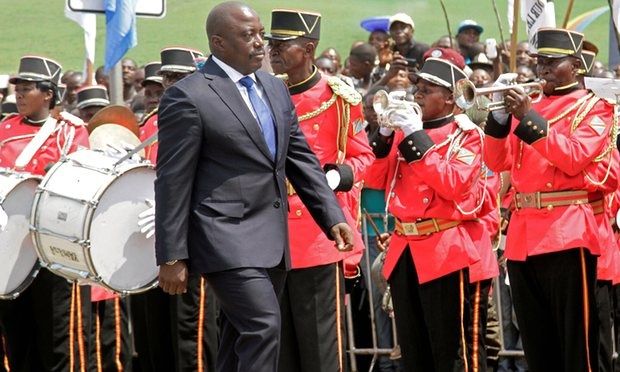.
Nous reprenons l’intégralité d’un article du journal britannique "The Guardian" du 10 novembre 2016, signé par Ruth Maclean et Jason Burke, qui annonce que la RDC court le risque d’une guerre civile si Joseph Kabila ne se retire pas. Pour la première fois, un journal occidental révèle que Joseph Kabila est un ancien chauffeur de taxi à travers un paragraphe souligné en rouge . Le temps nous prouve finalement qu'il n'avait pas les qualités intellectuelles et éthiques nécessaires pour diriger la RDC. Nous estimons que ce document qui est à la portée de tout le monde mérite d'être consigné sur le site de référence qu'est Mbokamosika. Ci-dessous: le lien de l'article du Guardian en anglais.
|
DEMOCRATIC REPUBLIC OF THE CONGO ‘FACES CIVIL WAR’ IF PRESIDENT FAILS TO QUIT.
Country has suffered repeated unreste since Joseph Kabila announced elections would be delayed and opposition leaders say people will « take to the streeets ».

Opposition leaders are warning that the Democratic Republic of the Congo (DRC) faces civil war if president Joseph Kabila does not relinquish his grip on power and step down when his mandate ends.
The DRC has suffered repeated bouts of unrest since Kabila, 45, announced that elections scheduled for this month would be delayed. The country’s ruling coalition and part of the opposition recently agreed to postpone the vote to April 2018.
However, the deal was boycotted by Rassemblement, the main opposition coalition, which says it violates the constitution. Congo’s powerful Catholic church also rejected the agreement.
The international community has watched the continued turmoil in the vast central African state with increasing alarm. Scores of demonstrators and several policemen were killed and the offices of major opposition parties badly damaged amid widespread looting during protests in September.
Kabila supporters say logistical and financial constraints mean it is impossible to hold fair polls as planned. Critics say the president, whose second term in office expires in December, is trying to cling to power by whatever means necessary.
“The people will take over,” said Etienne Tshisekedi, the 83-year-old leader of both Rassemblement and the Union for Democracy and Social Progress (UDPS), a political party. “Kabila has performed a coup d’état against himself by signing that agreement [to delay elections], because he made an oath to protect the constitution.”
Valentin Mubake, Tshisekedi’s political adviser, said civil war was “a predictable consequence” of the government’s delaying tactics.
“Elections are the only solution. Anything else will lead to war. The people will take to the streets. Kabila will kill one or two million of them but he won’t be able to kill 70 million,” he said.
Western states, including the US, have repeatedly told Kabila to stick to the election calendar or be prepared to surrender power. The US recently intensified targeted sanctions against senior individuals within the president’s inner circle.
The UN, which has an 18,000-strong peacekeeping force in the country, has asked political leaders not party to the new deal to “seek to resolve their differences peacefully”.
Kabila took over as leader of the DRC less than two weeks after his father, Laurent, was shot by a bodyguard in the presidential palace in 2001. He was elected president in disputed polls in 2006and again in 2011. The DRC’s constitution bars a third term.
Critics of Rassemblement have accused the coalition of trying to use the threat of street violence to extract concessions. The church suspended its own participation in the talks in September and has called for elections to be held in 2017. In a statement, bishops called for a firm commitment from Kabila not to run for a third presidential term.
Edem Kodjo, a former prime minister of Togo appointed by the African Union to facilitate negotiation talks, said “whether Kabila goes or not” or whether the Congolese took to the streets in protest and got “hunted” down by the security forces was not his problem.
Lambert Mende, a government spokesman, said any accusations that Kabila was trying to retain power were “gross lies”. The constitution stipulated that the president should not leave office until a new president was elected, Mende said.
“Only someone who has not read the constitution, or wants to discredit the president, would call this a constitutional coup d’état,” he said. “We have had problems with the electoral process and we had to find a way to manage these problems and give the Congolese people the opportunity to vote in the best electoral conditions possible.”
But Tshisekedi, the opposition leader, said the situation was worse than under Mobutu. The veteran politician said in an interview at his home in Kinshasa: “This is the worst situation we’ve ever been in. Nothing is working. The people have nothing, except hunger. The security situation is worse than ever. The whole country is unsafe, and [Kabila] hasn’t done anything.”
Under trees and faded beach umbrellas, crowds of people outside the main opposition party headquarters in Kinshasa have vowed that the protests will not end until Kabila is forced from office – no matter what violence is unleashed by the security forces.
“We’ve decided we’ll just keep going. If they kill us, well, we’re ready to die and those behind us will come up in our place,” said Kalala Tshinyama. “Mobutu killed people, but he didn’t finish all of us off. Kabila won’t kill all of us either.”
Ruth Maclean and Jason Burke in Kinshasa